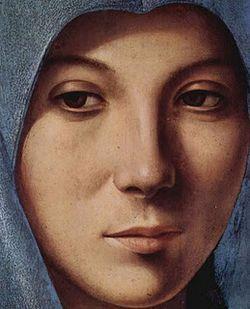 of related posts. Today we'll begin looking at the second of Pastor Pete's problems with the Catholic faith:
of related posts. Today we'll begin looking at the second of Pastor Pete's problems with the Catholic faith:
I don’t believe that Mary remained a virgin after the birth of Jesus and I don’t see any reason to hold that view in order to be saved from eternal damnation and be catholic. She obviously needed to be a virgin at the conception of Jesus in order to fulfill the prophecies of Isaiah concerning the virgin birth of Jesus. The Bible definitely refers to Jesus’ brothers and sisters, despite attempts to explain them away. So what if she was intimate with Joseph after Jesus’ birth. I say good for her and good for Joseph. Marital intimacy is a God given blessing. It isn’t something to look down on as immoral or some sort of human imperfection. It is something to praise God for. So unless there is some reason that escapes me, I don’t see the reason to divide people (i.e. differentiate true believers from non-true believers) on this point.
I think it best to start with what the Catechism (499-500) teaches:
Mary - "ever-virgin" 499 The deepening of faith in the virginal motherhood led the Church to confess Mary's real and perpetual virginity even in the act of giving birth to the Son of God made man. In fact, Christ's birth "did not diminish his mother's virginal integrity but sanctified it." And so the liturgy of the Church celebrates Mary as Aeiparthenos, the "Ever-virgin". 500 Against this doctrine the objection is sometimes raised that the Bible mentions brothers and sisters of Jesus. The Church has always understood these passages as not referring to other children of the Virgin Mary. In fact James and Joseph, "brothers of Jesus", are the sons of another Mary, a disciple of Christ, whom St. Matthew significantly calls "the other Mary". They are close relations of Jesus, according to an Old Testament expression.
More on the latter point:
The perpetual virginity of Mary has always been reconciled with the biblical references to Christ’s brethren through a proper understanding of the meaning of the term "brethren." The understanding that the brethren of the Lord were Jesus’ stepbrothers (children of Joseph) rather than half-brothers (children of Mary) was the most common one until the time of Jerome (fourth century). It was Jerome who introduced the possibility that Christ’s brethren were actually his cousins, since in Jewish idiom cousins were also referred to as "brethren." The Catholic Church allows the faithful to hold either view, since both are compatible with the reality of Mary’s perpetual virginity. Today most Protestants are unaware of these early beliefs regarding Mary’s virginity and the proper interpretation of "the brethren of the Lord." And yet, the Protestant Reformers themselves—Martin Luther, John Calvin, and Ulrich Zwingli—honored the perpetual virginity of Mary and recognized it as the teaching of the Bible, as have other, more modern Protestants.I really like what Mark Shea has to say about our modern filtration systems, evidenced by Pastor Pete's musings, that prevent us from accepting what the Church has taught over the ages:
For most of Christian history, Mary’s Perpetual Virginity was a commonplace belief, even well into the Protestant Reformation. But in our hyper-sexualized culture— and, like it or not, this is the culture in which Christians and non-Christians are now submerged like fish in the sea—people find it extremely difficult to contemplate the possibility of a life of virginity as anything but one of unbearable deprivation. So before we ever get to discussing what Scripture says, we’ve got a gigantic cultural hostility to virginity to overcome. Moreover, of course, our cultural biases aren’t confined to sex. Many card-carrying members of our consumer culture will wonder why anyone would choose to believe in something like Mary’s Perpetual Virginity. Behind such thinking is the notion of the Catholic faith as a mere smorgasbord of “belief options” that are there to accessorize our fashion choices. And so, conventional wisdom says: If you’re one of those strange souls who “like” virginity, then you can choose to believe in Mary’s Perpetual Virginity because it “suits your lifestyle.” But if you’re not one of these odd ducks, then why bother believing it? The answer is that the Catholic faith is not a product of consumer culture. It proposes certain truths to us, not because they suit our lifestyle, but because they’re true.The perpetual virginity of Mary, a proposed truth believed in by the likes of Origen, Hilary of Poitiers, Epiphanius of Salamis, Didymus the Blind, Augustine, Leporius, Cyril of Alexandria (and the Protestant Reformers already mentioned), is indeed, as Pastor Pete has opined, not something to divide over. The real question is... why are some insistent on their disbelief of this truth? I think it worth making again the point made in the first post in the series:
If, as Pastor Pete suggests, we are disqualified to be Catholic, we are disqualified only by our unwillingness to see and recognize authority outside of ourselves.Amen?
